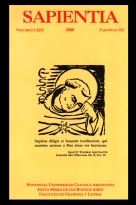Por favor, use este identificador para citar o enlazar este ítem:
https://repositorio.uca.edu.ar/handle/123456789/4726| Título: | La teoría aristotélica de la abstracción y su olvido moderno | Autor: | Miralbell, Ignacio | Palabras clave: | Aristóteles, 384-322 a.C.; Tomás de Aquino, Santo, 1225?-1274; ABSTRACCION; TEORIA; HISTORIA DE LA FILOSOFIA | Fecha de publicación: | 2008 | Editorial: | Pontificia Universidad Católica Argentina. Facultad de Filosofía y Letras | Cita: | Miralbell, I. La teoría aristotélica de la abstracción y su olvido moderno [en línea]. Sapientia. 2008, 63 (223). Disponible en: https://repositorio.uca.edu.ar/handle/123456789/4726 | Resumen: | Resumen: Este estudio analiza la teoría aristotélica de la abstracción, tratando de rescatar su sentido originario a partir de los textos del autor, así como los aportes de los aristotélicos medievales más relevantes, especialmente Tomás de Aquino. Y luego se pasa a describir algunos hitos fundamentales de la evolución posterior de dicha teoría en la historia de la Filosofía, como son: 1) La contraposición entre abstracción e intuición en Duns Escoto y Guillermo de Ockham. 2) el intuicionismo de Descartes 3) La reinterpretación empirista de la abstracción en J. Locke 4) La ausencia de la abstracción en el Espinoza, Leibniz y Kant, así como su sustitución por la “aufhebung” en Hegel. 5) La peculiar aproximación husserliana a la abstracción a partir de su método fenomenológico y 6) la relación de la teoría de la abstracción con el pensamiento de algunos autores contemporáneos como Zubiri, Polo y, especialmente, Heidegger. Abstract: This study analyzes the aristotelian theory of the abstraction, trying to rescue his original sense from the texts of the author, as well as the contributions of the most relevant medieval aristoteliciens, specially Thomas Aquinas. And then one passes to describe some fundamental milestones of the posterior evolution of the above mentioned theory in the history of the Philosophy, since they are: 1) The contraposition between abstraction and intuition in Duns Escotus and William of Ockham. 2) The intuicionism of Descartes 3) The empirical reintepretation of the abstraction in Locke 4) The absence of the abstraction in Espinoza, Leibniz and Kant, as well as his substitution for the “aufhebung” in Hegel. 5) The peculiar approximation of Husserl to the abstraction from his fenomenological methodology 6) the relation of the theory of the abstraction with the thought of some contemporary authors like Zubiri, Polo and, specially, Heidegger. |
URI: | https://repositorio.uca.edu.ar/handle/123456789/4726 | ISSN: | 0036-4703 | Disciplina: | FILOSOFIA | Derechos: | Acceso Abierto | Fuente: | Versión original impresa en Sistema de Bibliotecas UCA: Sapientia Vol. LXIII, Nº 223, 2008. |
| Aparece en las colecciones: | SAP - 2008 Vol LXIII nro. 223 |
Ficheros en este ítem:
| Fichero | Descripción | Tamaño | Formato | |
|---|---|---|---|---|
| teoria-aristotelica-abstraccion-olvido-moderno.pdf | 215,45 kB | Adobe PDF |  Visualizar/Abrir |
Visualizaciones de página(s)
1.317
comprobado en 30-abr-2024
Descarga(s)
852
comprobado en 30-abr-2024
Google ScholarTM
Ver en Google Scholar
Este ítem está sujeto a una Licencia Creative Commons

